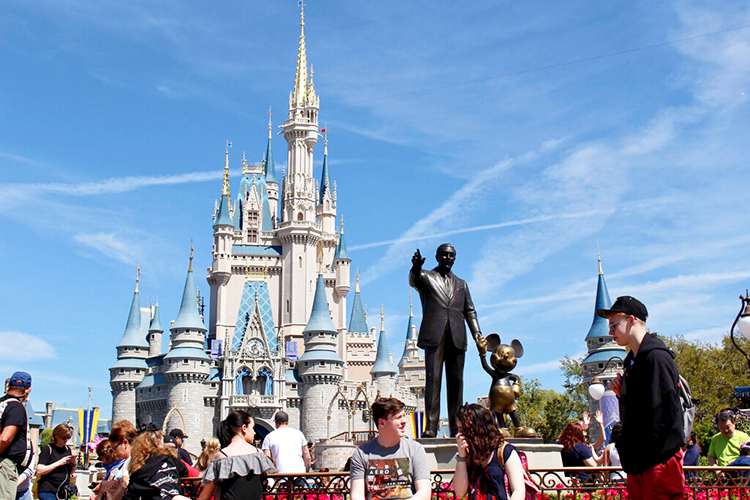'King Charles clause' limits new board overseeing Disney World, put in place after DeSantis' feud

Guests mill around in front of Magic Kingdom Park at Walt Disney World Resort in Orlando, Florida, in 2018. Photo by Kyodo via the Associated Press.
An agreement enacted by Disney World’s oversight board before its control was turned over to political appointees preserves power for Disney at the expense of the new board—and for quite a long time, thanks to a "King Charles clause."
Disney World had controlled the board for its special tax district since 1967, giving it control of fire and police protection, road maintenance and development planning, the New York Times explains in its story on the agreement.
But Republican Florida Gov. Ron DeSantis asked lawmakers to take away Disney World’s self-governing privileges after Disney opposed the state’s “Don’t Say Gay” law, which limits classroom discussion of sexual orientation and gender identity. The state legislature complied with DeSantis’ request, and the new board was appointed by DeSantis.
The new board was not aware of the agreement before it took over. It was enacted a day before the Florida House of Representatives voted to change board control, according to the Orlando Sentinel.
One provision of the agreement that gives Disney development authority for 30 years “seems totally valid, totally solid,” said Jacob Schumer, a local government land use attorney who spoke with Law360.
But long-running restrictive covenants in the agreement could be seen as self-dealing, Schumer told Law360. Those covenants ban the taxing district from using the name “Disney” or from using Disney figures or other Disney intellectual property without approval. They also prevent the taxing district from operating many kind of businesses, including hotels, entertainment venues and retail facilities, according to Law360.
The covenants remain in place in perpetuity. Or if that is deemed to violate the rule against perpetuities, they remain in effect “until 21 years after the death of the last survivor of the descendants of King Charles III, king of England living as of the date of this declaration.”
The clause has been called the “King Charles clause” or the “royal lives clause,” according to Bloomberg Law and CNBC.
The rule against perpetuities says an interest in land isn’t valid unless it vests no later than 21 years after some life in being at the creation of the interest.
“The rule varies,” says WFTV, “but most dictate that a person may only influence their land for the life of a living person at the time of a restriction’s creation, plus 21 years.”
According to Above the Law, the covenants tie up the land in ways benefiting Disney, “as long as the rule against perpetuities will allow! And that is why it still makes it onto the bar exam.”
The new board has hired four outside law firms to review the changes and possibly file suit.



